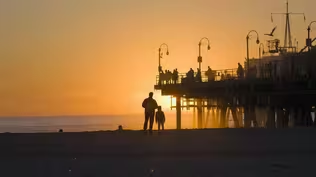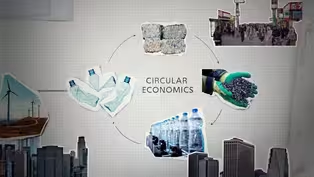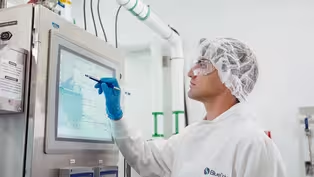
Diverse and Impactful Storytelling to Reimagine Our Futures
Clip: Episode 3 | 9m 59sVideo has Closed Captions
Ari visits a VFX studio to witness how technology is expanding storytelling limits.
Ari meets Rafael Augustin who is advocating and empowering the next generation to produce new and diverse stories. Additionally, Ari visits a VFX studio to understand how the latest technology is transforming and expanding the limits of how new stores are being made.
Problems playing video? | Closed Captioning Feedback
Problems playing video? | Closed Captioning Feedback
Supported by the Hoveida Family Foundation and The Rosalind P. Walter Foundation.

Diverse and Impactful Storytelling to Reimagine Our Futures
Clip: Episode 3 | 9m 59sVideo has Closed Captions
Ari meets Rafael Augustin who is advocating and empowering the next generation to produce new and diverse stories. Additionally, Ari visits a VFX studio to understand how the latest technology is transforming and expanding the limits of how new stores are being made.
Problems playing video? | Closed Captioning Feedback
How to Watch A Brief History of the Future
A Brief History of the Future is available to stream on pbs.org and the free PBS App, available on iPhone, Apple TV, Android TV, Android smartphones, Amazon Fire TV, Amazon Fire Tablet, Roku, Samsung Smart TV, and Vizio.
Buy Now
Providing Support for PBS.org
Learn Moreabout PBS online sponsorship[light music] ♪ ♪ - For years, Hollywood has attracted the best and brightest storytellers, yet only recently have we begun to understand just how limited our stories have been, in large part because of who's been able to tell them.
♪ ♪ But what would it look like if more people began to see themselves as storytellers, helping to shape new narratives, new futures they can actually see themselves in?
That led me here to meet Rafael Agustin, an award-winning screenwriter and author focused on broadening the boundaries of what stories are told and who gets to tell them.
Tell me a little bit more about you.
Like a first date, right?
So, like, we just sat down.
I just-- - Scorpio.
Long walks on the beach.
- Long walks--I just ordered two glasses of pinot noir, and we're getting to know each other.
Please.
- All right, so born in Ecuador, South America.
Came to the United States when I was, like, seven years old.
And it wasn't until high school, when I applied to go to college and I applied to get my driver's license that I discovered that we were undocumented.
- Growing up, until that point, did you feel different in any way?
Did you always feel kind of aligned within the communities that you were in?
- Well, the funny thing is, in Ecuador, we watched a lot of American movies and TV shows and pop culture.
- Cuidado, Batman!
[laughter] - Hollywood is the greatest export we have.
And not only me-- I think it's influenced an entire globe.
I remember one of the first movies that I fell in love with was, like, this-- I don't want to say "bad," 'cause I loved it, but it was a B action movie called "American Ninja"... - Yeah.
- Which starred-- - I've watched all three "American Ninjas."
Very influential.
- So you already know how important this movie is.
- It's extremely important on many levels, but I'll let you go into why.
- Heartthrob Michael Dudikoff changed my life, because since that moment, I wanted to be only two things in my life.
One was a ninja, and the other one was American.
I get to public school in the United States, when I show up to my first day of class, and I'm like, "Wait a minute.
"What are all these, like, Asian American kids?
"What are all these African American kids?
"Like, this doesn't look like the movies I watch.
This is too much diversity."
And then I saw, like, the Mexican American and Central American kids and realized that I look more like them than the white kids.
And then--so I was, like, seven years old when I realized, "Oh, my God, I'm--I'm not white."
- Rafael fell in love with storytelling at an early age.
But after only seeing his community represented by cliché stereotypes, he decided to write himself into a future he didn't see around him, first as a screenwriter, and now by enabling others to do the same thing for themselves.
- Scene five, cat, take two.
- Filmmaking has been around, so what we do is not, like, revolutionary.
It's the age that we do it at and the communities that we do it at that is so revolutionary.
[school bell rings] We essentially bring filmmaking mentors into the classroom twice a week for 90-minute blocks for an entire school year.
So we guide the students through the filmmaking process from the development of a concept all the way until their premieres, and we have their premieres at the Los Angeles Latino International Film Festival.
[applause] If every student learns not only that they can tell their story, but that they should, what kind of self-advocacy and self-respect is built into them?
How empowered are they when they realize that they can actually tell their own stories?
That's what's so critical about the work.
It's the social-emotional empowerment that's being built.
I went to a historically marginalized, low-performing school, and I watched 9- and 10-year-olds who look like me do the work that I couldn't do, and I--I nearly started crying.
- So tell me what it starts to look like on the other side.
- I think the stories that we tell are gonna be limitless.
I think our imagination is gonna be even more exciting, because we're seeing one another for the first time, and we're seeing each other's humanities, finally.
[soft music] ♪ ♪ - We have an amazing opportunity in this moment to rewrite the stories that define our time, to be so much bigger and more inclusive for the world we actually live in and the one we want to create.
But who wrote the stories that came before us, and how far back does this essential human trait of storytelling really go?
♪ ♪ That led me to Spain.
I'm here to visit the Cave of Ardales, where until recently, it was believed to contain some of the world's oldest recordings ever made by humans.
Thanks to a new discovery here, some of the markings in this cave now date back much, much further.
[speaking Spanish] - [speaking Spanish] - Pedro led me further into the cave, explaining that while animal bones were discovered outside, human bones were buried deep inside the heart of the cave.
They believe these early burial sites were a way of marking this cave as belonging to a clan and connecting them to their ancestors who came before.
But the most amazing thing is the discovery of markings on the walls that point to the very earliest forms of communication.
- Wow.
- What began as information, ways to communicate threats or danger, soon gave way to mythmaking-- art, early religion, and the very first recorded human stories.
[suspenseful music] ♪ ♪ [dramatic music] ♪ ♪ Over the many centuries since, our methods of storytelling have continued to evolve.
But the primal importance they serve to our sense of knowing who we are, where we belong, and where we are going is as strong now as it's ever been.
In Los Angeles, a team of artists and engineers are continuing to push these methods forward using AI-enhanced gaming engines to create the digital worlds of tomorrow.
- We are at Lux.
Lux is one of the frontrunners in LED volume virtual production.
They were early developers, early adopters in this tech and this information.
- What exactly is this?
- So this is called an "LED volume."
These are all motion-capture cameras that are used to track that camera in 3D space.
It's projecting in a 3D environment from a video-game engine.
- Give me an idea of how you actually use this.
- A good use case-- "Mandalorian" was a huge one.
That kind of brought it to the world.
But there's been versions of this for the last 90 years.
[ragtime music] Back in 1930, they started using rear projection.
Just Imagine and Liliom were the big ones.
- Just imagine the New York of 1980.
[whistle blasting] - They just started pushing it forward.
And those were called "motion special effects" at that time.
From that process, they kept iterating on it.
Now, instead of shooting on a blue screen, you have that environment that you can see in camera.
So it limits the compositing.
It limits all of those things that you need to do in post-production.
- So what this does is you have unbelievable flexibility.
You're able to change this in a matter of seconds.
- Absolutely.
We can do a time-of-day change, and we can make it early morning, dusk.
[soft music] And there we are.
- So now it's dusk.
- Yeah.
You can put crews in a different location at any time, but you can also shoot in this all day long.
And that's the beauty of it.
♪ ♪ - When you were growing up, you obviously, you know, went to the movies, like most of us, but then something clicked.
What was it that-- that drew you in?
What was the thing that caused you to kind of fall in love?
- I was always a big fan of the underdog story.
That was my thing, you know, "The Sandlot" and "Rudy."
- Since when are you the quitting kind?
all: Rudy!
Rudy!
- There's something about good storytelling that connects with the soul.
There's nothing that moves you as a human as much as storytelling.
And it goes back in history thousands of years.
It's to help unlock and understand the expression of emotions.
And those are the things that open us up as humans.
An Argument for a More Inclusive, Empowering Climate Story
Video has Closed Captions
Clip: Ep3 | 9m 13s | Ellen MacArthur advocates for a more sustainable, circular economy model. (9m 13s)
Video has Closed Captions
Preview: Ep3 | 30s | How do the stories we tell shape the boundaries of our beliefs about what is possible? (30s)
Providing Support for PBS.org
Learn Moreabout PBS online sponsorshipSupport for PBS provided by:
Supported by the Hoveida Family Foundation and The Rosalind P. Walter Foundation.
















